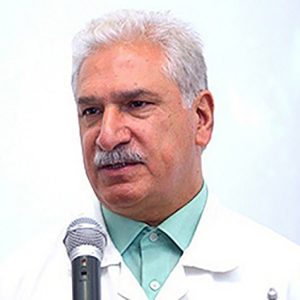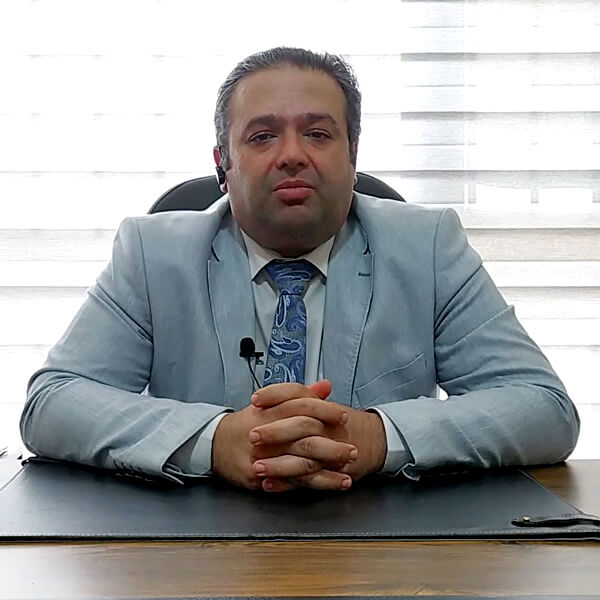Dr. Mohammad Reza Masjedi
Pulmonologist.
May 31st, World No Tobacco Day
In this video, Dr. Mohammad Reza Masjedi Pulmonologist, Secretary-General of the Anti-Smoking Society, speeches about lung diseases and corona.
The text of Dr. Masjedi‘s speech
In the name of God. I am Dr. Mohammad Reza Masjedi, a subspecialist in pulmonary diseases, a professor at Shahid Beheshti University of Medical Sciences, the Secretary-General of the Anti-Smoking Society, and also the CEO of the National Network for the Prevention of Non-Communicable Diseases. We are at the service of the Noor Charity Institute, a foundation supporting cancer patients, which is also a member of the National Network for the Prevention of Non-Communicable Diseases. In commemoration of the National No Smoking Week and World No Tobacco Day, which is internationally observed on May 31st each year, corresponding to the 10th of Khordad in the Iranian calendar, I will briefly present some information to you.
“As we are talking about national prevention of non-communicable diseases, I’ll provide a brief explanation in this regard, and then we’ll move on to the topic of smoking.” We have been dealing with something called coronavirus, which fortunately is on the decline, and now there is also something called monkeypox. The coronavirus created an international crisis. Monkeypox is a virus that is transmitted through respiratory means and is therefore classified as a communicable disease.
Diseases come in two types. They are either communicable and can be spread directly or indirectly from one person to another, carrying a pathogenic agent such as a virus, bacteria, or parasite. These are referred to as communicable diseases. Tuberculosis is part of these communicable diseases, as are malaria, whooping cough, scarlet fever, and coronavirus – all belonging to this category of illnesses. But there is an important group of diseases that are not communicable. This means they do not spread from person to person in this manner. These are non-communicable diseases. As a result, non-communicable diseases encompass a wide spectrum of illnesses. Four to five of them are particularly prominent, and based on those, you can consider the rest as well.
The first category includes cardiovascular diseases, which encompass conditions such as high blood pressure, stroke, and heart attack. Next, we have cancers. The third category involves chronic respiratory diseases. The fourth category is diabetes. And the fifth category is neurological and mental disorders. These five account for approximately 70% of global mortality. Now we have kidney diseases, blood disorders, bone diseases, skin conditions, gastrointestinal diseases, and joint disorders. All of these fall under the category of non-communicable diseases.
In the world, various NGOs and international agencies working in the field of non-communicable diseases have come together, forming networks to address these health challenges. In Iran, we also have the National Network for the Prevention of Non-Communicable Diseases, and the Noor Charity Institute is a member of this network. Now that we have discussed non-communicable diseases, I mentioned four to five specific diseases to you. We mentioned that 70% of mortality is due to these diseases. I reiterate. Cardiovascular diseases, including high blood pressure, heart attack, and stroke. Second, cancer. Third, chronic respiratory diseases. Fourth, diabetes.
The World Health Organization posed the question of what risk factors contribute to these four diseases that result in so much mortality. If we introduce risk factors to the public, we can prevent them. Prevention is much more valuable than treatment. Prevention is accessible, while treatment is often difficult, expensive, and not easily available. The World Health Organization stated that we mentioned four diseases, so let’s consider four risk factors. A match of four against four. At the forefront is tobacco use. The second is unhealthy diet, such as fast food, excessive sugar, oil, or salt, as well as the consumption of processed unhealthy foods. In every table, regardless of the economic status, whether in poverty or affluence, we all eat. However, unhealthy food on any table is itself a significant factor for non-communicable diseases. The third is insufficient physical activity. Someone who doesn’t walk, doesn’t engage in physical activity or exercise. This is another significant factor for non-communicable diseases. For female viewers, it’s important to note that women who don’t walk and don’t exercise are at risk of breast cancer and even cervical cancer. In men, prostate cancer and many other cancers are more likely if they don’t have sufficient physical activity, including adequate walking throughout the day and week.
So, one is tobacco use, the second is unhealthy diet, the third is insufficient physical activity, and the fourth is alcohol consumption. A fifth one is also added, which is air pollution, and unfortunately, it is not uncommon in our country. If we are talking about so much mortality, it’s good to raise awareness among the people in appropriate conditions. That’s why the World Health Organization has declared May 31 as World No Tobacco Day.
Fortunately, in our country, we are pioneers in many aspects, although we may have shortcomings in practice. Instead of just one day, we have a whole week. We have the Anti-Smoking Week. On this occasion, we announce some numbers to you. Approximately 6.5 million people have died due to COVID-19 in the past two to three years. Each year, at least 8 million people worldwide die due to diseases caused by smoking. This figure increases each year to reach 12 to 15 million people. And 85% of these deaths occur in poor and developing countries. The reason is that wealthy countries started the fight against smoking 20-30 years ago. The first of them was the United States. The US has the world’s largest tobacco industry. However, the most significant anti-smoking efforts began in USA in 1968, which is 60 years ago. For this reason, the rate of smoking in men has decreased from 52% to 24%. In women, it’s down to 18%. It’s less than half, but let’s look at the trend in our own country. The age of onset of smoking has reached 12 years. There was a time when girls did not smoke, and the rate in women was less than 1%, but now it has reached 4%. It means it has quadrupled. In men, it’s around 20%.
How many people smoke cigarettes in Iran? Between 8 to 10 million. If we don’t consider hookah, its statistics are alarming. If 4% of women in Iran smoke cigarettes, the statistics show that more than 35% of high school and university girls use hookah. I sometimes ask, inquire about how often they use the hookah, and they say once a week. This once is equivalent to smoking three packs of cigarettes. A regular cigarette contains 4,000 harmful substances. In hookah, there are up to 7,500 substances, and it is very harmful. We announce these figures because you need to know. In our Iran, approximately 55 to 65 billion cigarettes are consumed.
There is a statistic from the World Health Organization that every one million cigarettes causes one death. If 65 billion cigarettes are consumed in the country, that means 65 thousand people die every year due to diseases caused by smoking. It’s like two planes crash a day. And we are easily passing it. against what? In contrast to a factor that is toxic and preventable. They ask me, are there any good cigarettes? Is there a less harmful cigarette? Cigarettes have been advertised for pregnant women. Cigarettes for patients with neurological disorders. All of these are deceptive advertisements, promoting increased consumption. There is no harmless cigarette. Is there such a thing as a harmless poison? Cigarettes are poisonous. It is said that half of smokers die due to diseases caused by smoking. This is a common figure worldwide. it means that out of every 100 smokers, 50 die due to one of the diseases caused by smoking. Now, there is a connection between smoking and hookah with at least 20 types of cancer, heart attack, and stroke. Now, hookah is even worse, contributing to chronic respiratory diseases, diabetes, and various other illnesses. If 8 million people die directly due to smoking, 1.2 million people also die because they are exposed to cigarette smoke. These individuals are called passive smokers. For example, a pregnant woman sitting in a group where some people are smoking and using hookah, and she inhales this smoke through breathing. First, she experiences the consequences herself, and then the substances absorbed into her blood circulate through the bloodstream, affecting the fetus. Stillbirth. It means the birth of a dead baby, premature birth, or the birth of a baby with low birth weight and respiratory failure. And now, if this child is exposed to smoke and hookah until the age of four, the respiratory problems and the risk of death increase. Out of this 1.2 million worldwide deaths due to passive smoke, 65,000 are children.
These numbers are significant. Do not think that if you sit in a friendly gathering and everyone smokes hookah and cigarettes together, there is no problem. We have many women who come to us diagnosed with lung cancer, and they are not smokers. Either their husband, father, or one of the family members they have contact with is a smoker. And it was her who has developed cancer. The highest mortality in the world due to cancer is related to lung cancer, both in men and women.
So, the most important thing is prevention, and the Anti-Smoking Week is for raising awareness. The amount spent on smoking in the country is also considerable. If we consider 60 billion cigarettes, dividing it by 20, it would be 3 billion packs. 3 billion packs of cigarettes, even if one pack costs 10,000 Tomans, would be 30 trillion Tomans annually. They told me that the price of a cigarette pack in Iran ranges from 8,000 Tomans to 200,000 Tomans. If we consider the average to be 20,000 Tomans, it would be 60 trillion Tomans spent solely on cigarettes. And God knows how much is spent on hookah. But the World Bank says that governments spend twice as much on diseases related to smoking and hookah as people spend on cigarettes and hookah.
It is very important. In the words of one of our esteemed professors, if we can only control tobacco consumption, one-third of the country’s cancers will be reduced. Every year, between 120,000 to 140,000 new cases of cancer emerge in Iran. One-third is not a small figure. A cancer patient in a family is like an earthquake, causing not only emotional and psychological tremors but also economic shocks. There are those who sell the carpet from under their feet to afford chemotherapy drugs. They sell their house to save their loved ones. To be able to reduce one-third of these statistics by avoiding smoking and hookah is the responsibility of all of us. Those who smoke should quit, and those who can prevent should stand in the way of others.
The goal of the Anti-Smoking Week and World No Tobacco Day is exactly this. Now, in rich and developed countries where the fight against tobacco is taken very seriously, companies and the tobacco mafia shift their operations. They pursue profits, targeting countries with weak oversight and lax regulations, like our country. It’s the perfect excuse. The Comprehensive Law on Tobacco Control was approved in the parliament in 2006 (Iranian calendar year 1385). It seems that Iran is the only country in Asia and Africa with such a law. However, the effectiveness of our control measures and supervision is weak. One of our dear friends mentioned that our city has only six streets, but there are 37 hookah lounges. It’s alarming. They are only pursuing profit, and it doesn’t matter what consequences unfold. It doesn’t matter if our 14-15-year-old girls and boys smoke hookah and fall into the trap of addiction. the scented tobacco tempts anyone passing by to consume it, especially our young people who unfortunately lack recreational and sports facilities. This is a message we are sending to the government. Everything has become expensive – bread, oil, meat, milk, rice, eggs, cheese, everything. Meanwhile, our efforts to pass a tobacco tax in the parliament’s taxation committee unfortunately did not succeed. the proposed figure for the tobacco tax was 28 trillion tomans. Why wasn’t it approved? You should consider taking this figure, allocate half of it to the Ministry of Sports, and provide free sports facilities for our youth. Kids cannot afford to pay for renting a sports field themselves. We should learn from other countries.
We are developing Mehr housing. We are going to build 4 million houses. Wherever you build these houses, provide a sports field for boys and girls next to it. This is very important. Our youth need to fill their time. Instead of smoking cigarettes and hookahs for a few minutes of recreation, they should engage in sports.
This is this week’s message. But this year’s global message is about environmental protection. They say this year we should protect our environment. Why? To produce these cigarettes people hold in their hands, more than 600,000 trees are cut down each year. One cigarette butt and one filter. Four and a half trillion cigarette filters are distributed worldwide each year. Four and a half trillion cigarette filters. Each cigarette butt, if dropped on the ground, takes ten years to completely biodegrade in the soil. And during these ten years, each filter produces 4,000 to 4,200 toxic chemicals. One cigarette butt. See what we’re doing to the environment. We destroy forests. The best agricultural lands where we can cultivate strategic crops for oil, livestock feed, and poultry feed are in the provinces of Gilan, Mazandaran, Golestan, West Azerbaijan, Kermanshah, and Khuzestan. We take our most fertile lands and convert them into tobacco fields. It’s not fair. According to the law, it is prohibited. However, we do not adhere to the law.
The government says we want to become self-sufficient. Why don’t we become self-sufficient in other things? Don’t we want to become self-sufficient in oil production? In the production of rice? Wheat? Livestock and poultry feed? For years, there has been such a plan, both before and after the revolution. Shouldn’t we strive for self-sufficiency in other areas as well? Incentivize farmers and horticulturists, provide rewards for them. Instead of converting fertile lands into tobacco fields, focus on promoting crops such as rice, wheat, and livestock feed. And the tobacco companies give out rewards! Why don’t oil companies offer rewards? Why don’t rice companies provide incentives? Why doesn’t the government give rewards for livestock and poultry feed production? Let’s do this. To protect the environment, both trees and forests, as well as the land. According to statistics, 20 billion liters of water are used solely for the production of cigarettes worldwide. 20 billion liters!
That’s why this year, the World Health Organization’s slogan is to protect the environment against tobacco. What are the companies doing now? They’re looking for profit. The government tackles cigarettes, prevents hookahs, and electronic cigarettes emerge as an alternative. They promote electronic cigarettes with the slogan that electronic cigarettes are a tool for quitting smoking. In practice, this has not happened worldwide. Electronic cigarettes are several times more expensive. It was supposed to contain only nicotine, but heavy metals, arsenic, and various toxic substances have been found in them. The World Health Organization and even the U.S. Food and Drug Administration have declared the production, consumption, and distribution of electronic cigarettes prohibited. Then we heard in Iran that some well-known companies in the food production industry, whose names I won’t mention, are changing their business. They faced issues in that industry and want to establish an electronic cigarette factory in the country. And the Ministry of Industry, Mine and Trade, unfortunately, approves it in the name of job creation, while any development in cultivation, production, and industry should be discussed and approved in the National Tobacco Control Headquarters. The headquarters should hold meetings every six months, but it is inactive. I hope the new government takes effective measures. The amount that the government spends on the costs of diseases is a significant figure, believed to be over 200 trillion tomans per year. Whether it is directly provided by the government, contributed by the people, or covered by insurances, the amount is staggering.
So, let’s not overlook the harms of tobacco. Let’s not say, “Well, a few young people are gathering together, and since they don’t have recreational facilities, they smoke cigarettes and hookah.” Some people say, “If they don’t smoke these, they will use drugs!” So, are we left with no other option for young people? Is it either this or that? Is this really the way of thinking? Many of those in high positions in the government make such statements, and it is a source of concern. Really, if our young people don’t smoke cigarettes and hookah, should they resort to using drugs? This justification is incorrect, claiming that if we make cigarettes expensive and impose high taxes, people will turn to using drugs! Well, stop it then! Can’t we prevent it? When, according to the law, any direct or indirect advertising of tobacco products is prohibited, the Ministry of Culture and Islamic Guidance issues licenses for streaming TV series featuring popular actors who are constantly seen smoking, which contradicts the law. Now, I’m saying all these. How much influence do my words have? I’ve already said all this so much that I’m tired myself. A single film or a home series can undermine all our efforts. It’s prohibited by the law. removing many of these scenes of smoking and hookah wouldn’t have any impact on the script. Because it has been done. It’s prohibited in Australia and Canada. The same series that airs in Iran, when it’s shown in Turkey, the smoking scenes are censored, but it’s not in Iran. Now let’s look at our own television. In these series, there are still scenes of smoking and hookahs in Iranian television productions, which are prohibited according to the law.
It’s a significant concern. Let’s hope we all join hands to protect ourselves, our youth, and our environment. Let’s join hands. National days, global days, all of these are opportunities for us to collaborate and do something for each other with mutual assistance. We can do it. Despite all challenges, with collaboration and unity, we can achieve significant accomplishments. Good luck.




